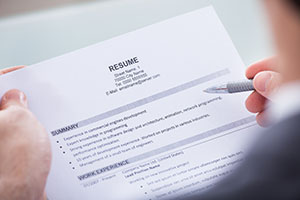
Gone are the days when a person could or would spend 30 years building a career at one company. Now, workers change jobs every two to four years. Unfortunately, for those who struggle to represent their core self in a single page, this relatively new phenomenon means resume editing and lots of it!
Everyone has compiled a list of skills, jobs, schools, and professional affiliations, but very few know how to leverage that information. Here are essential tips to polishing your resume, a task that’s never been more crucial, not with a 7% unemployment rate countrywide.
1. Pare down your resume (to one page).
Human nature being what it is, we grow bored quickly. And large clumps of text are more difficult for us to follow, particularly if we’re scanning. Most potential employers will scan tens or hundreds of resumes to make a short list of individuals they will then interview. At that point, they’ll give your resume a closer look.
You need to make it through that first pass, and the best way to do that is to eliminate everything that will not appeal to your target audience and make the rest easy to absorb with bullet points, bolding, and lots of white space.
What do you keep? You need to include jobs where you completed the tasks your new employer will expect of you, where you contributed the most added value, where you rose the highest, and where you stayed the longest.
That said, I’d avoid the chronological resume style. Instead of using “Employment” for your jobs, use something like “Teaching Positions” to indicate that these are the jobs applicable to the position. I’d also pare down your list of job responsibilities. Highlight leadership and core tasks.
2. Create an interes ting profile.
ting profile.
Another way to capture a potential employer’s attention is by creating a “Profile” section near the top where you summarize yourself in almost the same way you would in a personal ad. Incorporate the basics (years of experience, profession, and special skills) as well as trivia.
Take the following as an example: Ivy-league educated professional editor and proofreader with 10 years’ experience and proficiency in French and Italian who routinely catches spelling and grammar mistakes in The New York Times and published books. This is much better than a run-of-the-mill objective.
3. Foreground successes.
Within your list of responsibilities, include (in bold) your achievements. How did you improve the company’s bottom line? Did you decrease complaints through quality control? Save the company money? Or increase its earnings substantially? If you’re a teacher, what pass rate did your students achieve on the Regents? When possible, use numerical data. That’s much more striking.
4. Highlight professional development.
Employers want to know not only what you’ve done well in the past but also what you might be capable of in the future. Thus, you should include any conferences, workshops, or classes you attended to improve your industry knowledge and hone your skills.
5. Perform resume editing – frequently.
